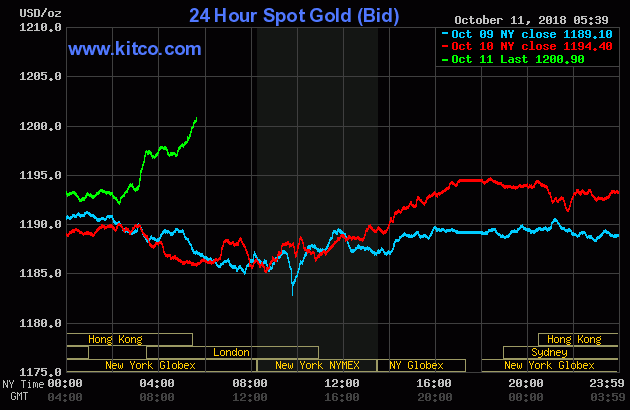Will October Stock Market Sell-Off Boost Gold Price?
What Happened?
Yesterday, U.S stocks experienced their worst performance since February. The Dow Jones closed down 831 points, or 3.6 percent. It was its second worst day of the year, as one can see in the chart below.
Chart 1: Dow Jones over the last twelve months.

The bears did not spear the S&P500. The index plunged 3.2 percent, marking its biggest daily decline since February, as the next chart clearly shows.
Chart 2: S&P500 over the last twelve months.

Importantly, the weakness did not start yesterday. The S&P500 experienced a five-day losing streak, the longest since November 2016. And in October, the index is down more than 4.4 percent.
Why It Happened?
Why did the bears awake? As always, there are many explanations. Some people point out rising interest rates. Indeed, as the Fed has been gradually rising the federal funds rate, the bond yields followed suit. As one can see in the chart below, the 10-year Treasury yields jumped above 3.2 percent in October, the highest level in a few years. Higher rates make bonds more appealing relatively to the more risky equities.
Chart 3: 10-Year US Treasury Yield over the last twelve months.

Other analysts mention global trade wars in general and the trade dispute between the US and China in particular. After Vice President Mike Pence very hawkish remarks about China a few days ago, investors could start to worry that the trade dispute transformed into trade war. Indeed, the risk aversion has risen. The CBOE Volatility Index spiked about 44 percent to 22.96, the highest level since the beginning of April.
And do not forget about the correction in China’s stock market which started on Monday. In 2015-2016, concerns about China’s economy led to the global rout. Trade wars will not help China’s economy, so investors fear about the potential slowdown.
However, it might just be a bull market correction. You know, corrections sometimes happen – and they are actually healthy for the market. Surely, it’s too early to state this with certainty, but has anything really changed in the economy? The Fed has been hiking for months, so it’s not a surprise. Neither Trump’s trade war is something new for the investors. And the US real economy seems to continue its growth. The Atlanta Federal Reserve’s GDP Now forecast model showed yesterday that the U.S. economy is expanding at a 4.2 percent annualized rate in the third quarter.
Implications for Gold
Will the stock-market sell-off boost the gold prices? Well, it’s actually happening. As the chart below shows, the price of gold has surpassed $1,200 today.
Chart 4: Gold prices since October 9 to October 11.

It makes sense. When risk aversion rises, safe-havens, such as gold, benefit. However, gold does not have to rally. Let’s look at the chart below. As one can see, the yellow metal declined in tandem with the S&P500 in February.
Chart 5: Gold prices (yellow line, right axis) and the S&P500 Index (green line, left axis) in 2018.

Indeed, if traders have finally acknowledged that the Fed is going to continue its policy of gradual tightening and just repositioned themselves, the gains in gold might be temporary. But if we see a more permanent bear market or a rise in the risk aversion, gold may rally in a more sustained way. What is important here is that interest rates are rising because of the economic growth. The normalization of monetary policy, although it may cause some market volatility, should be positive for the economy in the long run. This is bad news for the gold bulls, at least from the fundamental perspective.
Arkadiusz Sieron
Sunshine Profits - Free Gold Analysis
* * * * *
All essays, research and information found above represent analyses and opinions of Przemyslaw Radomski, CFA and Sunshine Profits' associates only. As such, it may prove wrong and be a subject to change without notice. Opinions and analyses were based on data available to authors of respective essays at the time of writing. Although the information provided above is based on careful research and sources that are believed to be accurate, Przemyslaw Radomski, CFA and his associates do not guarantee the accuracy or thoroughness of the data or information reported. The opinions published above are neither an offer nor a recommendation to purchase or sell any securities. Mr. Radomski is not a Registered Securities Advisor. By reading Przemyslaw Radomski's, CFA reports you fully agree that he will not be held responsible or liable for any decisions you make regarding any information provided in these reports. Investing, trading and speculation in any financial markets may involve high risk of loss. Przemyslaw Radomski, CFA, Sunshine Profits' employees and affiliates as well as members of their families may have a short or long position in any securities, including those mentioned in any of the reports or essays, and may make additional purchases and/or sales of those securities without notice.

















